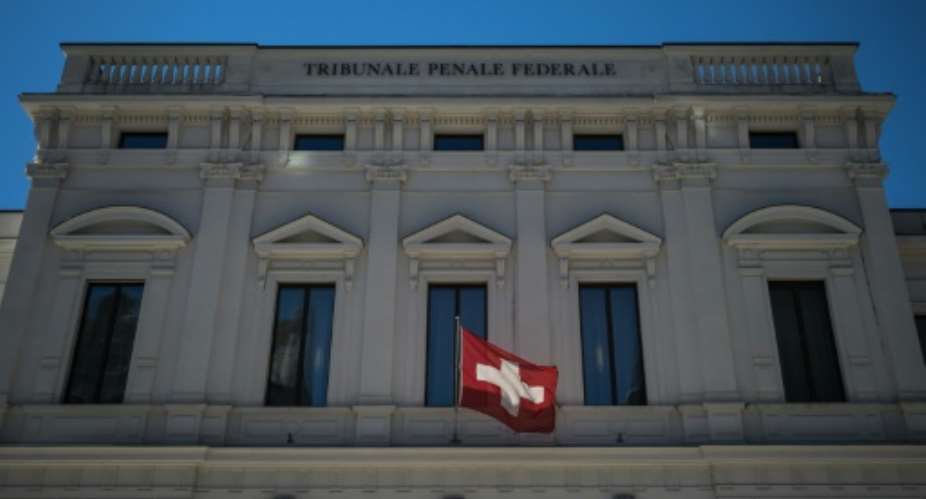A Swiss appeals court on Thursday upheld a 20-year sentence for a former Liberian warlord, confirming his war crimes conviction and, for the first time in Swiss history, handing down a verdict of crimes against humanity.
Alieu Kosiah was found guilty by Switzerland's Federal Criminal Court in June 2021 of war crimes over multiple atrocities committed during the first of Liberia's back-to-back civil wars, in which around 250,000 people died between 1989 and 2003.
The court in the southern city of Bellinzona found him "guilty of violating the laws of war".
The verdict marked the first time a Liberian was convicted -- either within the west African nation or anywhere else -- of war crimes committed during the conflict.
Kosiah, who settled in Switzerland in 1998 and was arrested in the Alpine country in 2014, appealed against that verdict, pleading his innocence and demanding an acquittal.
But on Thursday, the Federal Criminal Court's appeals chamber, also in Bellinzona, confirmed the earlier ruling and the accompanying sentence of 20 years behind bars. The appeal ruling also said he should be deported and barred from re-entering Switzerland for 10 years.
Most strikingly, it agreed with the prosecutor and plaintiffs that his actions also merited the most serious tag of crimes against humanity.
That marks the first time anyone has been convicted of that charge in Switzerland, made possible by a law change in 2011.
Murder, rape
This ruling is "historic", human rights lawyer Alain Werner, who heads the NGO Civitas Maxima and represents four of the seven plaintiffs, told AFP.
"This is a great day for these incredibly brave Liberian victims who crossed seas to find justice, and obtain it in spite of Ebola at the beginning of the case, and Covid-19 at the end," he said.
"It is also a great day for justice and for Liberia."
Like war crimes, crimes against humanity refer to atrocities, including murder, torture and rape. However, instead of isolated or sporadic events, the charge is used for incidents carried out in a widespread or systematic way.
In the 2021 verdict, Kosiah, now 48, was found guilty of a slew of war crimes committed as commander of the United Liberation Movement of Liberia for Democracy (ULIMO) rebel group.
He ordered or participated in the killing of 17 civilians and two unarmed soldiers, as well as rape, and deploying a child soldier, the court ruled.
He had also ordered lootings and repeatedly ordered, or had himself inflicted, cruel and humiliating treatment of civilians, and mishandled corpses, according to that verdict.
'Not isolated crimes'
Prior to Thursday's appeal verdict, Raphael Jakob, a lawyer for one of the plaintiffs, stressed the importance of ruling that crimes against humanity had been committed.
"It would be an important recognition that these are not isolated crimes, but are part of a pattern of systematic criminality," he told AFP, adding that his client was "among tens of thousands of victims who suffered similar atrocities".
So far, only a handful of people have been convicted in Liberia itself for their part in the brutal wars, and efforts to establish a war crimes court in the country have stalled.
But a Paris court last November found another former Liberian rebel commander, Kunti Kamara, guilty of crimes against humanity.
And earlier this year, another suspected warlord, Gibril Massaquoi, appeared in a Finnish appeals court accused of atrocities in Liberia's civil war following his acquittal last year by a lower court.
Former Liberian warlord-turned-president Charles Taylor was convicted in 2012 by an international UN-backed court in The Hague of war crimes and crimes against humanity, but that was over atrocities committed in neighbouring Sierra Leone, not in his own country.





 Former Kotoko Player George Asare elected SRC President at PUG Law Faculty
Former Kotoko Player George Asare elected SRC President at PUG Law Faculty
 2024 elections: Consider ‘dumsor’ when casting your votes; NPP deserves less — P...
2024 elections: Consider ‘dumsor’ when casting your votes; NPP deserves less — P...
 You have no grounds to call Mahama incompetent; you’ve failed — Prof. Marfo blas...
You have no grounds to call Mahama incompetent; you’ve failed — Prof. Marfo blas...
 2024 elections: NPP creates better policies for people like us; we’ll vote for B...
2024 elections: NPP creates better policies for people like us; we’ll vote for B...
 Don’t exchange your life for wealth; a sparkle of fire can be your end — Gender ...
Don’t exchange your life for wealth; a sparkle of fire can be your end — Gender ...
 Ghana’s newly installed Poland train reportedly involved in accident while on a ...
Ghana’s newly installed Poland train reportedly involved in accident while on a ...
 Chieftaincy disputes: Government imposes 4pm to 7am curfew on Sampa township
Chieftaincy disputes: Government imposes 4pm to 7am curfew on Sampa township
 Franklin Cudjoe fumes at unaccountable wasteful executive living large at the ex...
Franklin Cudjoe fumes at unaccountable wasteful executive living large at the ex...
 I'll 'stoop too low' for votes; I'm never moved by your propaganda — Oquaye Jnr ...
I'll 'stoop too low' for votes; I'm never moved by your propaganda — Oquaye Jnr ...
 Kumasi Thermal Plant commissioning: I pray God opens the eyes of leaders who don...
Kumasi Thermal Plant commissioning: I pray God opens the eyes of leaders who don...
